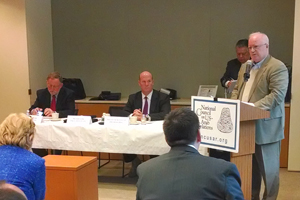President Obama’s Coming Visit to Saudi Arabia in Perspective
Download as PDF
That the foreign policies of various governments often appear to be contradictory is because they frequently are. Certainly of late, this seems to characterize aspects of the Obama administration’s relations with the six Gulf Cooperation Council (GCC) countries – Bahrain, Kuwait, Oman, Qatar, Saudi Arabia, and the United Arab Emirates.

President Barack Obama walks with King Abdullah of Saudi Arabia and members of the Saudi Arabian delegation during the King’s visit to the White House on June 29, 2010. Photo: White House.
This ambiguity and the confusion and uncertainty that accompany it are among the things that President Barack Obama will need to dispel and clarify in the course of his upcoming visit to Saudi Arabia. As this essay seeks to demonstrate, what he will have to contend with in terms of background, context, and perspective will not be easy of resolution, amelioration, or even abatement.
Despite the many largely unreported positives there are numerous negatives that need to be addressed lest a situation that is seen by many within this globally vital region as increasingly tendentious and quarrelsome become the more so, for no good reason.
On one hand, Washington has strengthened and extended its overall position and influence in the GCC region. For example, the multi-year, multifaceted U.S.-Saudi Arabia Strategic Dialogue has been elevated for the past three years to a GCC-U.S. Strategic Dialogue, and there have been strategic, reassurance-themed visits to multiple GCC countries by U.S. Secretaries of Defense and State Chuck Hagel and John Kerry.
Additionally, there have been continuing sales to GCC countries of tens of billions of dollars of U.S.-manufactured defense and security structures, systems, technology, and arms. ((“$10.8B U.S. Arms Sale Reassures Gulf Allies at Touchy Time,” United Press International. October 18, 2013. http://www.upi.com/Business_News/Security-Industry/2013/10/18/108B-US-arms-sale-reassures-gulf-allies-at-touchy-time/UPI-92581382116294/.)) Americans have also signed long-term contracts with these countries for the provision of munitions, maintenance, repairs, spare parts, and equipment sustainability, all of which have translated into the generation and extended life span of millions of American jobs.
Yet, simultaneously, signals from Washington and the mainstream U.S. media indicate that the Obama administration is recalibrating the strategic focus of its international priorities. Great emphasis, for example, is being placed on the Asia-Pacific regions.
Affecting the need to recalibrate are major budget reductions and their impact on strategic concepts, forces, and operational dynamics. At issue and under examination, according to the Secretary of Defense in advance of the Quadrennial Defense Review (QDR) are America’s assumptions, ambitions, and abilities. ((Richard L. Kugler and Linton Wells II, Strategic Shift: Appraising Recent Changes in U.S. Defense Plans and Policies. Washington, D.C: Center for Technology and National Security Policy, Institute for National Strategic Studies, National Defense University, 2013. p. vii.)) Understandably, the GCC region’s reaction to these trends and indications has been mixed.
Continue reading »




You must be logged in to post a comment.